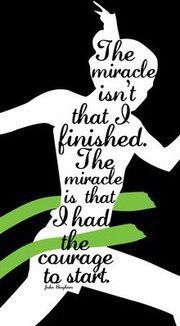|
I saw the cardiologist yesterday and our conversation went something like this:
Cardio: I saw the report from Stanford and I somewhat agree. You have POTS, postural orthostatic tachycardia syndrome and orthostatic hypotention AND sinus tachycardia. The small nerves that regulate your heart and blood vessels are... Me: So, how can I help myself get better? Cardio: degenerating. In most people the condition you have will worsen over time. Me: But is there anything I can do to help myself get better? Cardio: In most people the nerves will degenerate over time until they no longer work. Me: But what can I do to help myself get better? He hugs me. Literally. Me: OK, what can I do to keep it from getting worse? Cardio: Gentle exercise... Me: Good, I joined a gym. Cardio: You can sit and stand up and lift weights while on your back Me: That's doable My disautonomia has no cure nor will it get better. I suffer from bouts of extreme exhaustion and most of the time it is caused by me making my body work too hard. I knew better than to go out on Halloween with the kids, but what if I don't have a next Halloween? I wanted that memory so I made it. I do that a lot. I grab every moment I can even if I suffer for it later. I will not be deprived from an experience with my family. I just won't. It is not in my play book. Until I can't, I won't. November is dysautonomia awareness month. Thank you to the Mayo Clinic in advance for use of this material. Overview Autonomic neuropathy occurs when the nerves that control involuntary bodily functions are damaged. It can affect blood pressure, temperature control, digestion, bladder function and even sexual function. The nerve damage interferes with the messages sent between the brain and other organs and areas of the autonomic nervous system, such as the heart, blood vessels and sweat glands. While diabetes is the most common cause of autonomic neuropathy, other health conditions — even an infection — can be to blame. Some medications also might cause nerve damage. Symptoms and treatment vary based on which nerves are damaged. Symptoms Signs and symptoms of autonomic neuropathy depend on the nerves affected. They might include:
I have exercise intolerance, but I push it. I don't know if it helps or not, but since I've been told the condition will only get worse, anything is open. My body also runs two degrees less in temperature than normal. If I get a 98 on my thermometer I am running a fever. My husband is amazed at how cold my hands are, but they don't bother me. I also stopped sweating for several years. When they put me on prednisone for Crohn's a year ago, I started sweating again. That's one of the ways they determined it is autoimmune. Weird, but there you go. I do have sluggish pupils too. Good God, one day I'm fine and the next day everything is a freaking blur. It is all about exertion. If I over do, I pay. Today is pay day. (Insert smiley face) I also faint, get lightheaded, and if I forget my medication that I take four times a day, my heart will jump up into the 200s and my blood pressure will fall to like 60/30. I hate it and I have forgotten, though I've never meant to. Sometimes, time just goes by too fast. Or I'm concentrating too hard. I also get these tremors, just in my arms mind you, but it is totally freaky. They shake on their own until they stop. I have no control. The food part is a hoot. I never know if it's Crohn's or dysautonomia. Blood is my go to symptom and since it is still an issue, I get to start Remicade once a month instead of every 8 weeks, starting tomorrow. Spending Saturday at the hospital was not my plan for the weekend. Of course my gastro gave me the list of symptoms of side effects that will now ramp up because I am on the shortest time allowable and a potent dose.
Oh, wait! I forgot!
You have to laugh, right? I am so fortunate that I have an upbeat personality. I do have down days, the poor mes that get me moping around the house, but my husband is there beside me, nudging me, saying things like: Hey! It beats the alternative! He's so right. I am still writing, though it has suffered over the last year. BUT! I am off to edit round 3 on Gemini Rising. I had to take a couple days to digest all the information from my doctors, but hell, as long as I can live in my books, I do not mind sitting on the couch so much. It is always the perspective that matters. I can go anywhere and do anything as long as my laptop is with me. If you are reading this and you have dysautonomia or Crohn's disease, don't lose hope. There are good days, beautiful days when the stars align and you feel wonderful, when kids distract you or you gaze on something so lovely it takes your breath away and you completely forget about the problems that dog you. If you have POTs caused by an illness, remember you will recover. It may take time, but get out there and fight. It will get better. I have learned that it is not the amount of time you spend with those you love, it is the quality of that time. Spend it with those you love and those who love you. If you require a wheelchair, there are tons of walking trails that are handicap friendly. I have discovered that the quiet of the forest embraces and sustains me. Remember that new drugs and cures happen every day. Never give up hope. Life is beautiful seen from my perspective. Pray often, give thanks for what you have, and if you do good for others, you will discover just how awesome life is. So hang in there. It certainly beats the alternative. Shalom Comments are closed.
|
Sign up today for freebies and fun. Grab your chance at signed copies of my paperbacks and free e-books.
For Kobo coupons click here or copy and paste the link into your browser.
http://www.therawfeed.com/stores/kobobooks-com |
Proudly powered by Weebly





 RSS Feed
RSS Feed

